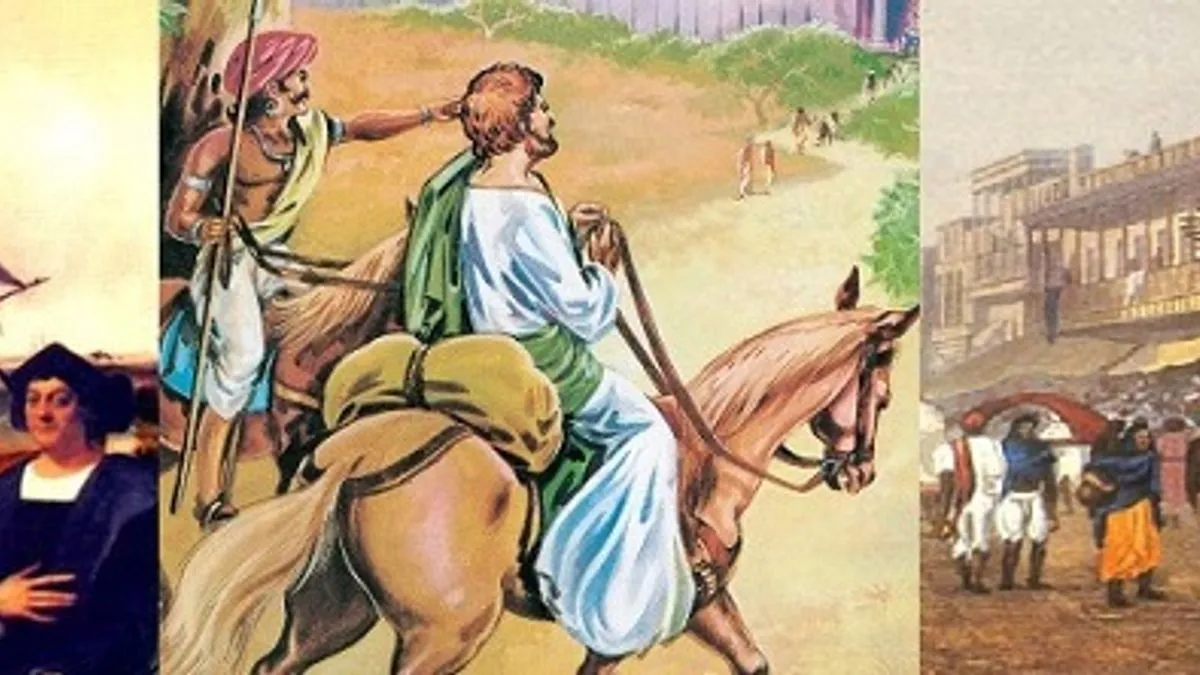The accounts of foreign travelers who visited India between the 9th and 14th centuries offer a unique perspective on the social, political, and cultural landscape of the subcontinent during a period of significant change. These travelers, hailing primarily from the Arab world, left behind detailed travelogues that provide invaluable insights into the lives, beliefs, and practices of the people they encountered.
A Journey Through Time: The Accounts of Arab Travelers
These travelogues are not merely descriptions of exotic lands; they are windows into the minds of the travelers themselves, revealing their biases, motivations, and perceptions. Their accounts are shaped by their own cultural backgrounds, religious beliefs, and personal experiences, making them both fascinating and complex sources of historical information.
Sulaiman the Merchant: A Glimpse into North India
One of the earliest Arab travelers to leave a detailed account of India was Sulaiman, a 9th-century Muslim merchant and writer. Sulaiman’s travels took him across vast stretches of Asia, including India and China. His travelogue, known as Akhbar al-Sin wa al-Hind (The Book of the Chinese and the Indians), is a treasure trove of information about the political and social structures of North India during his time.
Sulaiman provides us with a glimpse into the flourishing of the Gurjara-Pratihara dynasty in North India, describing the powerful king Mihira Bhoja as a formidable ruler with a large army and significant wealth. He also mentions the Pala dynasty of Bengal, acknowledging their position as a powerful force in the region. Sulaiman’s account highlights the political fragmentation of India at the time, with various dynasties vying for power and influence.
Al-Masudi: A Scholar’s Perspective on the Deccan
The 10th-century Arab scholar Al-Masudi, known for his work Muruj al-Dhahab wa Ma’adin al-Jawhar (The Meadows of Gold and Mines of Gems), is another significant figure in the history of Arab travel writing. While Al-Masudi’s travelogue focuses primarily on the Deccan region, it also provides valuable information about the political landscape of North India.
Al-Masudi’s account provides a fascinating insight into the conflict between the Rashtrakuta and Pratihara dynasties, highlighting the ongoing power struggles that characterized the period. He refers to the Pratihara rulers as the “Algurjar” and their king as the “Bohra,” providing a unique linguistic perspective on the time. Al-Masudi’s description of the Rashtrakuta women not observing purdah, a practice common in other parts of India, reveals the diversity of social customs across the subcontinent.
Al-Biruni: A Scholar’s Quest for Knowledge
The 11th-century scholar Al-Biruni, who accompanied the invading Afghan ruler Mahmud of Ghazni on his campaign to India, is perhaps the most famous Arab traveler to have documented his experiences in India. Al-Biruni’s magnum opus, Kitab al-Hind (The Book of India), is a comprehensive and detailed account of the social, cultural, and scientific aspects of India in the 11th century.
Al-Biruni’s work stands out for its depth and breadth, reflecting his keen interest in understanding India’s diverse culture and knowledge systems. He meticulously documented the caste system, describing the four varnas and the untouchables, highlighting the social stratification that characterized Indian society. He also analyzed the legal system, noting the different punishments for different classes, with Brahmins receiving special treatment.
Al-Biruni’s Observations on Family, Marriage, and Social Practices
Al-Biruni’s account offers a vivid picture of family life, highlighting the patriarchal nature of Indian society, where inheritance laws favored sons and women had limited rights. He also provides insights into marriage practices, noting the emphasis on lifelong partnerships and the absence of divorce. His description of the practice of sati, where widows immolated themselves on their husband’s funeral pyre, reveals the harsh realities faced by women in certain social contexts.
Al-Biruni’s Insights into Indian Science and Knowledge
Al-Biruni’s deep interest in Indian science and knowledge systems is evident throughout his work. He meticulously documented Indian astronomy, mathematics, medicine, and geography, comparing them with the knowledge systems of the Arab and Greek worlds. He also explored the use of weights and measures, highlighting the unique system employed in India. Al-Biruni’s work is a testament to the intellectual curiosity and scientific spirit that characterized his time.

Ibn Battuta: A Traveler’s Account of the Delhi Sultanate
The 14th-century Moroccan traveler Ibn Battuta, famed for his extensive travels across the Islamic world, spent several years in India during the reign of the Delhi Sultanate. His travelogue, Rihla (Travels), provides valuable insights into the political, social, and economic conditions of the Sultanate during a period of significant change.
Ibn Battuta’s account offers a detailed description of the reign of Muhammad bin Tughlaq, a controversial ruler known for his ambitious but often disastrous policies. He provides a firsthand account of the Sultan’s attempts to relocate the capital from Delhi to Daulatabad, the introduction of token currency, and the harsh punishments meted out to those who opposed his policies. Ibn Battuta’s account is a fascinating blend of admiration and criticism, reflecting the complexity of Muhammad bin Tughlaq’s personality and reign.
Ibn Battuta’s Observations on Indian Society and Culture
Beyond the political realm, Ibn Battuta’s travelogue provides insights into the social and cultural landscape of India. He describes the lifestyle of the elite, their customs, and their religious beliefs. He also provides insights into the social practices of the Hindu population, including the caste system, sati, and the practice of slavery. Ibn Battuta’s account highlights the diversity and complexity of Indian society, with its intricate social hierarchies and deeply rooted traditions.
Ibn Battuta’s Insights into the Economics of the Delhi Sultanate
Ibn Battuta’s travelogue also sheds light on the economic aspects of the Delhi Sultanate, describing its land revenue system, agricultural practices, handicraft industries, trade, and commerce. His account highlights the importance of port cities like Calicut, where shipbuilding flourished, and the role of trade in shaping the Sultanate’s economy. Ibn Battuta’s observations on the economic life of the Sultanate offer a valuable perspective on the region’s prosperity and its integration into the wider world.
A Legacy of Insights: The Value of Arab Travelogues
The travelogues of these Arab travelers offer a rich and multifaceted perspective on the history of India between the 9th and 14th centuries. They provide a unique blend of firsthand observations, cultural interpretations, and personal reflections, offering a valuable counterpoint to traditional Indian historical narratives.
These accounts are not without their limitations, however. Their biases, rooted in their own cultural backgrounds and religious beliefs, must be acknowledged and considered when analyzing their observations. Nevertheless, their detailed descriptions of the political landscape, social practices, cultural beliefs, and scientific knowledge of the time make them invaluable sources of information for historians and scholars.
These travelogues serve as a reminder of the interconnectedness of the ancient world, highlighting the role of travel, trade, and cultural exchange in shaping the course of history. They offer a glimpse into the lives, beliefs, and practices of people from different cultures, providing insights into the complexities of the human experience across time and space.

